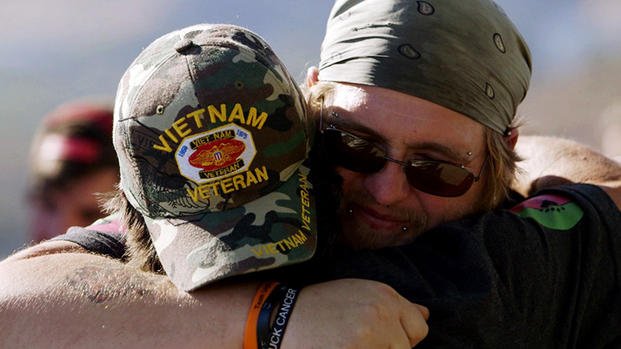I'm not a big fan of documentaries or movies about war, homecoming or really anything that reminds me of all the hard things I try to forget about this military life. I figure military life is hard enough as it is. I don't need "entertainment" to remind me about it.
But a new documentary offers such a thoughtful, well researched and helpful view on both the challenges and potential solutions for military mental health issues, that I had to make an exception.
"Thank You For Your Service," which won "best documentary" at the G.I. Film Festival this year, focuses on the struggle of a few Marines whose unit was responsible for several Iraqi civilian casualties in 2003. Battling what experts in the film call "morale injury," one Marine is driven to the brink of suicide while the relationships and mental health of the others also unravel.
The film features a parade of now retired military leaders, current and past public officials and leaders in the veteran mental health space who you will recognize -- retired Adm. Mike Mullen, former Secretary of Defense Robert Gates, Sen. Patty Murray (a Washington Democrat), actor Gary Sinise, author and director Sebastian Junger and many more -- discussing what has gone wrong in the military when it comes to mental health.
"Thank You For Your Service" is thoughtful and worth watching because it doesn't just document all the terrible things we already know about PTSD. Instead, it actually offers some solutions and ways that not just the military as a whole can address the problem, but ways individuals can help veterans, too.
On a big picture level, the film advocates for the founding of a Behavioral Health Corps within the DoD.
But it is the implications for average community members that I found far more interesting -- particularly the idea that part of the problem is in how we address war and service to start with.
An expert in the film introduces the idea that part of the reason military members have trouble dealing with what they experienced lies in how American society addresses its warriors (or, in many cases, doesn't) and views their military service. The expert likened our view of homecoming and war winning to a football game. We celebrate war and waging war as if it was a good thing, when the reality is that, as the film puts it, "there should never be cheering."
%embed1%
Waging war is not something worth celebrating, he says. War is a necessary evil. The war fighters do their duty -- and they should be honored for that. But war itself is not something to celebrate.
Instead what we should be doing, the film suggests, is honoring, listening -- and then asking ourselves what we, the non-military members, are doing to serve. While thanking a veteran for his or her service is a good way to start a conversation, it's what come next that really matters, director and producer Tom Donahue told me.
"We don’t need to say 'thank you' to them. They're doing their duty. What we need to do is ask ourselves: 'what are we doing?'" he said. "It's nice to thank people, don't get me wrong, but they're doing their duty, and you need to do your duty as well."
This film helped me think through what that duty can be for those who do not serve. And I wonder if it is in the simple act of listening and learning to relate to veterans in our communities.
Donahue said he was told before making the film that he would likely have trouble getting veterans to talk on camera. But he found the opposite to be true -- veterans wanted to talk about their experience. They just wanted someone who was willing to listen.
"If you're willing to listen and ask questions they will speak to you," he said. "I learned to have a great respect for them."
One way to spread the message of the film, Donahue said, is by organizing a screening of the film at a local movie theater in your town.









